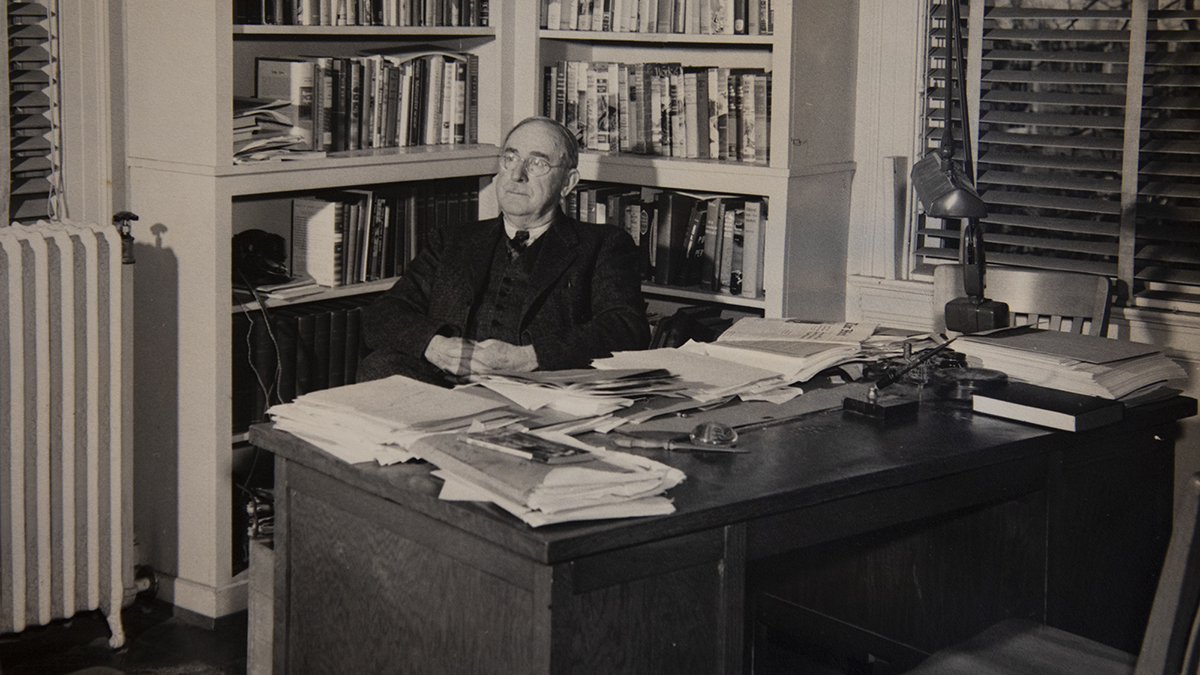A father for social science
The Odum Institute, the first social science research center in the world, has trained and supported hundreds of researchers specializing in everything from anthropology to city and regional planning to public health for the past 95 years. And it all exists thanks to the determination of one eccentric man.

Restless, indefatigable, a spirit of challenge. These are how people describe Howard Odum. At 6-foot-2, he was big in stature but more so in character. He worked 18 to 20 hours a day and at home could often be found sitting amidst piles of books and papers in his office, deep in thought or writing.
He didn’t care for small talk or parties and, in general, found social life trivial. He would kick off a meeting only to sneak out to go write in his office, returning about an hour later to wrap things up. But what he lacked in interest in routine matters he made up for in enthusiasm. He was always moving, his thoughts pouring from his lips like a late-afternoon deluge — so much so that students had trouble keeping up with his lectures. He even signed his letters, “Hurriedly yours.”
“His eyes were on fire,” Kathy Hill, his granddaughter, remembers of him. “He was this burning fuel who had his wing of the house and everyone gave him berth.”
Like moths, his flame drew the attention of his colleagues as well. “He was like a human dynamo,” Guy and Guion Johnson, the husband-and-wife team that became Odum’s first research assistants, once wrote. “Always active, constantly generating new ideas.”
Odum arrived at Carolina in 1920 with “a head full of dreams.” By the time he was 36, he had already earned Ph.D.s in psychology and sociology and published his first book. In his first two years at Carolina, he founded the School of Social Work (then called the School of Public Welfare), organized the Department of Sociology, and started the Journal of Social Forces— all the while raising pedigreed Jersey cattle.
Perhaps most importantly, he founded the Institute for Research in Social Science in 1924. Today, it’s better known as the Odum Institute for Research in Social Science, the oldest university-based interdisciplinary social science research institute in the world.
What began as home base for UNC-Chapel Hill researchers focused on the social and economic problems of the South has evolved into a center that fosters interdisciplinary research and offers training, consulting and other support services to faculty across campus.
But how did it become this? The answer, for both Odum the man and the institute, is people.
Ahead of his time
Guy Johnson knew Odum on paper before meeting him in person, their relationship a product of handwritten letters and Johnson’s first submission to the Journal of Social Forces— a piece on the Ku Klux Klan. Johnson, a sociologist, agreed to come to Carolina in 1924, but only if his wife Guion could get a position, too. At the time, she was heading the journalism department at the Baylor College of Women. Odum offered them both $1,500 and a research assistantship.
Guion was the first female research assistant ever hired at the university. Within a year of her arrival, Odum also brought in Harriet Herring, who spent the next 40 years researching the social ills connected with the industrialization of the South. He also hired Katharine Jocher, who began as the institute’s executive secretary, but was ultimately named assistant director in 1927 and stayed in that role for 30 years.
“[Odum] was a pioneer in bringing women into what was pretty much an all-male institution when he got here in the ’20s,” said John Shelton Reed, director of the institute from 1988 to 2000. “Those three women were among the first, if not the first, to be taken seriously at UNC. […] Some people were not happy about it, but Odum didn’t care. He plowed ahead on that front.”




